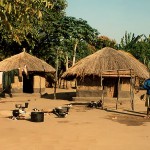
IIé ihò inú àpáta – Cave House
Òrùlé wà lára ohun ini pàtàki ti ó yẹ ki èniyàn ni, ṣùgbọ́n èniyàn kò lè sun yàrá meji pọ̀ lẹ́ẹ̀kan. Ki ṣe bi èniyàn bá fi owó ara rẹ̀ kọ́ ilé ni ìbẹ̀rẹ̀ ilé gbigbé. Bàbá á pèsè òrùlé fún aya àti ọmọ, ki ba jẹ: ilé ẹbi, abà oko, ihò inú àpáta, ilé-àyágbé tàbi kọ́ ilé fún wọn.
Ni ayé òde oni, ilé ṣi jẹ ohun pàtàki fún èniyàn, ṣùgbọ́n á ṣe akiyesi pé ọ̀pọ̀lọpọ̀ Yorùbá, kò ránti ọ̀rọ̀ Yorùbá ti ó sọ pé “Ọ̀kọ́lé, kò lè mu ràjò” mọ́. Ọ̀pọ̀ nkọ́ ilé àìmọye ti èniyàn ò gbé, lai ronú pé, bi àwọn bá ràjò, wọn ò lè gbé ikan ninú ilé yi dáni. Ọ̀pọ̀ nkọ́ ilé fún àwọn ọmọ – fún àpẹrẹ, ẹni ti ó kọ ilé marun nitori ohun bi ọmọ marun si ilú ti wọn ngbé tàbi bi ọmọ si.
- Abà oko – Farm Huts. Courtesy: @theyorubablog
- Ilé – House. Courtesy: @theyorubablog
- Ilé rẹpẹtẹ – Many Houses Courtesy: @theyorubablog
Ò̀we Yorùbá sọ pé “Ọ̀nà ló jin, ẹru ni Baba”. Ẹ jẹ́ ki á fi òwe yi ṣe iranti pé, ayé ti lu jára, ọmọ, ẹbi àti ará kò gbé pọ̀ mọ́ bi igbà ayé-àgbẹ̀. Bi wọn bá ti ẹ̀ gbé ilú kan naa, ìṣòro ni ki ọmọ bá Bàbá àti Ìyá gbé lọ lai-lai. Bi ó pẹ́, bi ó yá, ọmọ tó dàgbà, á tẹ si iwájú nitori bi Bàbá bá kọ́ ilé rẹpẹtẹ si Agége, kò wúlò fún ọmọ ti o nṣiṣẹ ni Ìbàdàn, Àkúrẹ́ tàbi Òkè-òkun. Bi Bàbá ti ó kọ ilé rẹpẹtẹ bá fẹ́ lọ ki àwọn ọmọ, ẹbi tàbi ọ̀rẹ́ ni ilú miran, ìṣòro ni ki ó gbé ikan ninú ilé rẹpẹtẹ yi dáni.
Ọ̀pọ̀ oníjìbìtì, Òṣèlú, Oníṣẹ́-Ìjọba ti ó ni ojúkòkòrò ló nkó owó ilé lọ sita lati lọ ra ilé si Òkè-Òkun lai gbé ibẹ̀, ju pé ki wọn lo o ni ọjọ melo kan lọ́dún. Ìnáwó rẹpẹtẹ ni lati tọ́jú ilé si Òkè-Òkun tàbi ilé ti èniyàn kò gbé , nitori eyi, ọ̀pọ̀ ilé yi kò bá àwọn ti ó kọ́ ilé tàbi ra ilé kiri yi kalẹ̀. Àwọn Òṣèlu àti Oníṣẹ́ Ìjọba ti ó nja ilú lólè, lati fi owó ti wọn ji pamọ́ nipa ki kọ́ ilé rẹpẹtẹ tàbi ra ilé si Òkè-Òkun ni “Orúkọ ọmọ, òbí tàbi orúkọ ti kò ni itumọ”, kò lè gbé ilé wọnyi lọ irin àjò tàbi lọ si ọ̀run ti wọn bá kú.
ENGLISH TRANSLATION
Shelter is one of the important essentials for living things, but people cannot sleep in two separate rooms at the same time. Putting up personal building is not the beginning of living in a house. Fathers provide shelter for their wife and children, even if it is: family house, farm-hut, a cave, rented accommodation or build a house.
In modern times, housing is still very important for people, but it is observed that many Yoruba people no longer remember the Yoruba adage that said “Home-owner cannot travel with his/her house”. Many, build uncountable houses that are not inhabited, without thinking that if they travel, none of the houses could be taken along. Many also, built in reserve for their children – for example, a person who built five houses because he/she has five children in the town in which they live or where the children were born.
One of the Yoruba proverbs said “Though the distance is far, a slave has a father”. Using this proverb as reminder that the world is now global, children, family and contemporaries no longer live together within the same community as it was in the Agricultural Era. Even when they live within the same town or country, it is rare for the adult children to live with parents for ever. Sooner or later, a grown up child, will move on, because father’s many houses in Agege (a Lagos Community) are of no use to the son/daughter that is employed in Ibadan, Akure or Overseas. When the need arises for a father with so many houses, to travel to visit children, family or friends in other Cities, it is impossible to carry one of the many houses along.
Many greedy fraudsters, Politicians, Government Workers siphon money from home country to buy houses abroad without living in such houses except on a few days’ visit in a year. It is very expensive to maintain houses abroad or empty homes, as a result many of these houses never lasted with the owners till the end. Politicians and Government Workers that embezzle/steal public fund in order to invest such stolen fund in building many houses or buying houses Oversea using “Children’s names; parent’s name or fictitious names”, cannot take any of such houses along when travelling or to the grave at death.
Originally posted 2014-09-16 21:28:09. Republished by Blog Post Promoter





